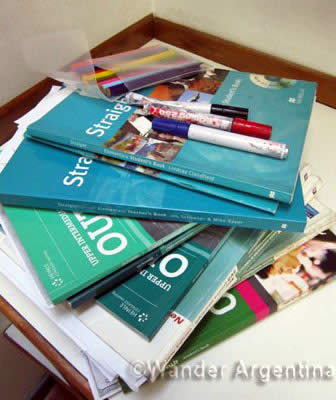Teaching English is the most common job among English-speaking expats in Argentina but the experience can vary widely from ‘easy money’ to ‘logistical nightmare.’
There are a number of things to consider before taking an English teaching job with a school. It’s also important to plan for the sometimes involved logistics of the job in order to strategize how to make the most money possible without creating extra work for yourself.
School Resources
Even the most casual of English teachers needs resources. The school’s advertised ‘well stocked library’ may in reality be a few musty old books on an ancient shelf. When considering a job offer check whether you are allowed to take the books to classes. Sometimes you may be expected to come to the office to plan before your class. Also check whether you are supposed to use a course book with your classes, and if so, whether the students actually have a copy of the book. Using photocopied books is common, and it is sometimes problematic. Find out whether a school or company has whiteboards, board pens and the policy on photocopying. Some schools expect their teachers to do their own photocopying in copy shops around town, Do they reimburse you for this? Other places allow copies but only if you send them to the secretary to print out. Some even charge their students per copy, which means you have to note down every piece of paper you duplicate.
Travel time
Unpaid travel time is one of the biggest woes of the English teacher in Argentina, particularly in big bad Buenos Aires. Try to plan classes back-to-back in the same business or neighborhood, even if they pay less than other options. With every class you are offered consider if it is worth the travel time. Also question if the institute pays more for classes outside of Capital Federal (the metro area).
Administrative Work
Due to a high turnover of English teachers, some institutes require teachers to note down exactly what was done in every class. A bit of admin here and there is no problem, but if you are expected to detail the lesson aims and procedure of every class on a complicated spreadsheet — which must be sent twice a day — consider whether this is worth your while. Another useful question to ask is whether you are expected to attend office meetings. Sometimes institutes will ask you to meet veteran teachers to swap notes, or attend a ‘teachers’ meeting.’ If this is the case, check whether they pay you for you time.
Class Schedule
The majority of institutes will offer a small number of hours or classes with the expectation that you will work for other schools as well. It’s a good idea to ask about schedule flexibility and whether you can expect more classes in the future. It is also useful to ask how many other teachers they have working for them and how long they have worked there, in order to get a better idea of whether it’s a decent place to work.
Dress code
The normal dress code for a teacher is whatever you like, except flip-flops or holey clothes, although this clearly varies depending on the school and the students. If you’re teaching at businesses the institute may require you to dress smartly. If you don’t already own this sort of wear, consider whether it is worth it to invest in the appropriate clothing or bring business casual clothes with you to Argentina. Clothes are not as cheap in Argentina as one might expect.
Conclusion:
Unless you work for one of the fancier schools, which have a tendency to treat staff well, while working as an English teacher in Argentina, you will need to decide how many logistical difficulties you are willing to tolerate for the job. It may help to view some of the common ‘downsides’ of working as an English teacher as positives. Perhaps you won’t mind travelling for an hour to get your pay, just to engage in an hour of conversation with bored office workers. If you prefer conversation classes, you may not mind not having any books to work with. If you don’t receive holiday pay, at least you’ll be able to take time off whenever you want. And if you want to get to know the city, travelling from class to class can be an excellent way to familiarize yourself with public transport. Upon first arriving in Argentina, working at a school or institute is a good way to make contacts and find one’s footing. Later on, you can start to think about building a base of private students. To achieve this, ask around — there are thousands of expats in Buenos Aires and across Argentina, who have at some point been English teachers and can give you leads. The number of Argentines all over the country interested in English classes is pretty much infinite. Just don’t say in your initial interview that you plan to ditch the school as soon as you build up a base of private students — that usually doesn’t go over too well. — Rosie Hilder


